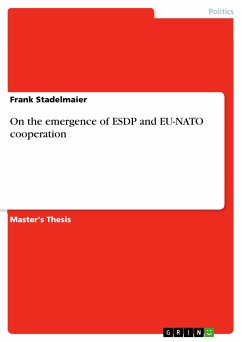Bachelor Thesis from the year 2006 in the subject Politics - Topic: European Union, grade: 1, University of Twente (Bedrijf Bestuur en Technologie), language: English, abstract: In the conclusion of the European Council in December 2005, the Presidency mentions only in a single sentence what had filled covers of newspapers the days before: "The European Council reached agreement on the Financial Perspective 2007-2013 as set out in doc. 15915/05."1 It was the second attempt after a former Council six month before, and also this time it needed tough negotiations and a number of revised proposals, until the quoted sentence could be printed. The reason for this controversy can be summarized in an old German adage: "Beim Geld hört die Freundschaft auf." Those who are partners in other situations begin to bargain over every Euro they have to spend for the EU budget, giving short-term national interests priority to long-term EU interests. In some way this is understandable, despite the fact that the Council should bring forward the European project - politicians are elected in the nation states and have to justify every Euro they leave in Brussels. Besides this, the term of "solidarity" has neither in Article I-2 of the "Treaty establishing a Constitution for Europe"2 , nor in article 1 of the "Treaty on European Union"3 been concretised. But nevertheless the difficulties surrounding the agreement on the Financial Perspective are symptoms of a serious problem: Countries which pay more into the budget than they get back, the so-called net contributors, feel to have unacceptable high costs in relation to the benefits they gain from their EU-Membership. The debate on "net positions" is one of the major reasons which lead to the low acceptance of the European Union in public: According to Eurobarometer, 62% of the population are worried "about the increasing costs for the Member States of building Europe."4 Only the fear of a transfer of jobs to other Member States was mentioned more often (73%).
Dieser Download kann aus rechtlichen Gründen nur mit Rechnungsadresse in A, B, BG, CY, CZ, D, DK, EW, E, FIN, F, GR, HR, H, IRL, I, LT, L, LR, M, NL, PL, P, R, S, SLO, SK ausgeliefert werden.
Hinweis: Dieser Artikel kann nur an eine deutsche Lieferadresse ausgeliefert werden.









